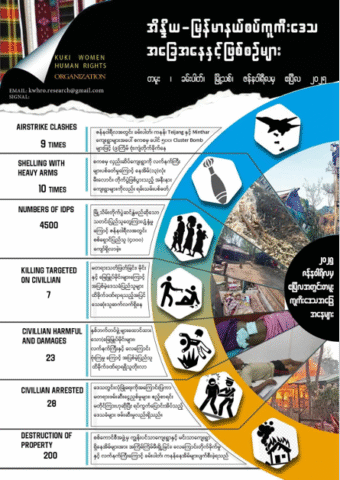The Kuki Women’s Human Rights Organization (KWHRO) says in the four years since the military coup, 149 civilians have been killed in Tamu District along the India-Myanmar border, with justice still denied for the victims.
The KWHRO made this statement in its quarterly report released on 2 May, highlighting the situation in the Kuki region along the India-Myanmar border.
A spokesperson for the KWHRO stated that the majority of civilian killings were carried out by the junta forces and Pyu Saw Htee militias.
“For those who are suffering, the concept of justice is a word they have yet to hear from anyone, even to this day. In fact, there is no justice. As we call them armed forces, the majority of the violations are committed by the junta and their allies, the Pyu Saw Htee militias. The rest are some groups,” the official said.
The report states that from 2021 to April 2025, in the Kuki region, 14 underage children, 36 women, and 69 men were killed due to the junta’s airstrikes and artillery shelling and landmines, killings by junta-backed Pyu Saw Htee. Additionally, 30 individuals remain unaccounted for and their bodies have not been identified.
Additionally, it is reported that over 2,000 homes in 16 villages in Tamu District have been destroyed by arson, displacing more than 20,000 local residents.
Most of the internally displaced people are taking shelter along the India-Myanmar border and within Myanmar’s borders.
Some are living in farmland and plantations, while others, particularly parents from rural villages, are renting homes in Tamu town to ensure their children can continue their education.
In the Kuki region of Tamu District along the India-Myanmar border, the number of displaced people has risen to over 4,500 during the past four months, with urgent needs for medical supplies and healthcare assistance, according to a spokesperson for the KWHRO.
“Currently, the major health need is urgent. On our side, we’re dealing with common seasonal issues like colds, coughs, and especially diarrhea. We desperately need help with these conditions. However, we’re unable to assist with everything on our own. We are in need of aid. We can’t make it accessible to everyone. These are reported not only refugees here but also the people in the villages controlled by Kuki army. Basically, it’s happening in every village,” the spokesperson said.
Due to the hot weather, there is a scarcity of drinking water, and skin diseases and diarrhea have become more prevalent.
Access to medical treatment at hospitals and clinics is also hindered by roadblocks, with people often having to rely on traditional medicine.
In January of this year, news of a battle to capture Tamu emerged, prompting around 3,000 locals to flee to the border.
Since the outbreak of ethnic violence in Manipur State in 2023, the state government has been continuously monitoring Myanmar refugees, restricting their movement across the border, and limiting access to healthcare and the exports of medical supplies, according to the KWHRO.
The KWHRO is reportedly issuing quarterly reports to highlight and clarify the human rights violations, local conditions, and the specific challenges faced by women in Tamu District, which is experiencing ongoing clashes in Tamu District on the India-Myanmar border.
Sent by KMG

